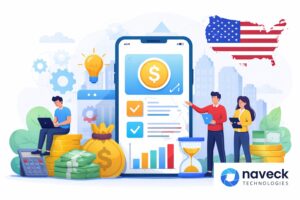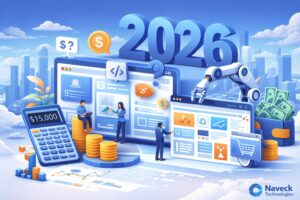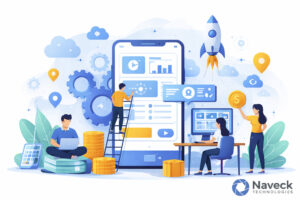The year 2025 marks a pivotal moment in the evolution of software development. What began as theoretical ideas and early-stage tools has now matured into a transformative force: AI agents. These intelligent, semi-autonomous entities are no longer just futuristic dreams—they are actively reshaping how software is conceived, built, tested and deployed.
From automating routine tasks to providing intelligent insights and even crafting complex code, AI agents are redefining the roles of developers and accelerating the pace of innovation. This shift isn’t merely about incremental improvements; it’s about a fundamental paradigm change leading to unprecedented efficiency, quality and creativity in the digital realm.
Why 2025 Feels Different
According to a recent technology trends report by McKinsey & Company, “agentic AI and application-specific semiconductors” have been added to their “Top Tech Trends” list, signalling that intelligent assistants are moving from niche to mainstream in software development. McKinsey & Company Moreover, the research firm Gartner lists “AI agents” as one of the fastest-advancing technologies in its 2025 Hype Cycle, reflecting both high adoption potential and enterprise focus. Gartner
What Are AI Agents Doing in Software Dev Today?
-
Tools now go beyond autocomplete or syntax suggestions — they actively plan, coordinate workflows, test code and even repair bugs. For instance, an article from GitLab explains how “agentic AI” is shifting development from isolated coding tasks to intelligent workflows. about.gitlab.com
-
A survey by PricewaterhouseCoopers (PwC) in 2025 found that 79 % of organizations are already using AI agents in at least one function, and 88 % of senior executives surveyed expect to increase budgets for these tools. PwC
-
The broader software development trends overview notes that AI-assisted coding has gone mainstream in 2025: companies are relying on AI tools like code-generation assistants, bug detectors and architecture critics. Data Centers
Why This Matters for Your Team or Business
-
Developer roles are shifting: Developers are moving from writing boilerplate code to orchestrating and supervising intelligent systems. This means the value lies in design thinking, architecture, oversight and tool-integration rather than just syntax. Gartner
-
Time-to-market and quality gain acceleration: With AI agents automating repetitive or error-prone tasks, teams can iterate faster, catch issues earlier and deliver higher-quality outcomes with fewer manual bottlenecks.
-
New tooling stacks and skill-sets: Organizations now need to evaluate “agent frameworks” (for building customised agents) and integrate them into workflows, rather than simply buying generic tools. Alvarez & Marsal
-
Strategic advantage vs risk: As agentic AI becomes a competitive differentiator, businesses that adopt smartly will gain advantages — while those that lag risk being out-paced or stuck with legacy workflows.
The Dawn of the Autonomous Developer: What Are AI Agents?
At its core, an AI agent is an intelligent program designed to perceive its environment, make decisions, and take actions to achieve specific goals. In the context of software development, these agents are becoming increasingly sophisticated, moving beyond simple automation scripts to truly autonomous entities. They can understand high-level commands, break down complex problems, and orchestrate various tools and processes.
Think of them as specialized digital assistants, each trained for a particular set of tasks within the software development lifecycle (SDLC). Some might excel at generating code, while others focus on testing, security, or even project management. The beauty lies in their ability to work independently or in concert, mimicking a highly efficient development team.
Reshaping the Software Development Lifecycle: A Phase-by-Phase Transformation
The impact of AI agents is not confined to a single stage of software development; rather, it permeates the entire lifecycle, making each phase more intelligent, efficient, and less prone to human error.
Intelligent Requirements Gathering and Analysis
The journey of any successful software project begins with clear and precise requirements. Traditionally, this phase can be fraught with ambiguity and misinterpretation. However, AI agents are now stepping in to revolutionize this critical initial stage.
They can analyze vast amounts of data from existing projects, user feedback, and market trends to identify potential features, suggest missing requirements, and even flag inconsistencies. This proactive analysis ensures a more robust foundation for development, significantly reducing costly rework down the line. AI tools for daily business use are already demonstrating their prowess in data analysis and insight generation, making this a natural extension.
Accelerated Design and Prototyping
Once requirements are solidified, the design phase kicks into high gear. Generative AI, a subset of AI agents, is proving to be a game-changer here. These agents can rapidly create wireframes, user interface (UI) mockups, and even full-fledged prototypes based on textual descriptions or even rough sketches.
This acceleration allows designers and stakeholders to iterate much faster, visualizing different design possibilities and making informed decisions early on. The time saved in this stage translates directly into a quicker time-to-market for new applications.
The Code Generation Revolution: Beyond Boilerplate
Perhaps the most visible and impactful change brought by AI agents is in the realm of code generation. No longer a novelty, AI code generators are now sophisticated enough to produce functional code snippets, entire functions, and even complex application modules from natural language prompts. This capability dramatically speeds up development by handling repetitive and boilerplate code.
Developers can now focus their intellectual energy on solving complex architectural challenges, innovating new features, and refining the overall system design. For a deeper dive into this specific area, explore the top AI code generators for developers. This marks a profound shift, freeing human talent from the mundane and elevating their role to higher-level problem-solving.
Smarter Testing and Quality Assurance
Testing is an exhaustive, yet absolutely critical, phase in software development. AI agents are fundamentally transforming how quality assurance is performed. They can automatically generate test cases, identify edge cases that humans might miss, and even prioritize tests based on code changes or risk assessment.
Beyond just identifying bugs, advanced AI agents can even suggest potential fixes or pinpoint the exact lines of code causing an issue, significantly reducing debugging time. The field of AI specialized software testing is rapidly expanding, demonstrating the significant advantages of this approach in catching defects early and ensuring robust applications.
Automated Security Audits and Vulnerability Detection
In an increasingly interconnected world, software security is paramount. AI agents are becoming indispensable allies in identifying and mitigating security vulnerabilities. They can continuously scan codebases for known exploits, detect anomalous behavior in running applications, and even predict potential attack vectors.
This proactive approach to security ensures that applications are built with resilience in mind from the outset. By integrating AI-powered security agents into CI/CD pipelines, organizations can maintain a higher level of security posture, protecting sensitive data and maintaining user trust.
Intelligent Deployment and Monitoring
The journey of software doesn’t end at development and testing; it extends to efficient deployment and continuous monitoring. AI agents are streamlining CI/CD (Continuous Integration/Continuous Delivery) pipelines by automating release processes, managing infrastructure as code, and coordinating complex deployments across various environments.
Once deployed, these agents provide real-time monitoring of application performance, identifying bottlenecks, predicting potential outages, and even initiating self-healing mechanisms. Their ability to analyze vast streams of operational data ensures that applications run smoothly and efficiently, minimizing downtime and maximizing user experience.
The New Role of the Developer: From Coder to Orchestrator
The rise of AI agents does not spell the end of the developer role. Instead, it signals an exciting evolution. Developers are transitioning from being primarily “coders” to becoming “orchestrators” and “architects.” Their new responsibilities include:
- Prompt Engineering: Crafting precise and effective prompts to guide AI agents in generating the desired code and solutions.
- Architectural Design: Focusing on high-level system architecture, integrating various AI-generated components, and ensuring scalability and maintainability.
- Validation and Refinement: Reviewing AI-generated code, providing feedback, and refining it to meet specific business logic and performance requirements.
- Complex Problem Solving: Concentrating on truly novel and complex problems that still require human creativity, intuition, and abstract reasoning.
- Ethical Considerations: Ensuring that AI-generated code adheres to ethical guidelines, security best practices, and avoids biases.
The ability to build successful remote development teams, especially with the integration of AI agents, becomes even more critical in this evolving landscape. Companies are increasingly leveraging expert partners like a dedicated software development company to navigate these complex shifts.
Key Trends Driving the AI Agent Revolution in 2025
Several interconnected trends are fueling the rapid integration and increasing sophistication of AI agents in software development:
1. Generative AI Maturity
The significant advancements in large language models (LLMs) and other generative AI techniques are directly empowering AI agents. Their ability to understand context, generate human-like text, and translate natural language into code has reached an unprecedented level of maturity. This is why many are exploring the best AI business ideas for startups leveraging these capabilities.
2. Multi-Agent Systems and Collaboration
The future isn’t just about a single AI agent doing one task. We are seeing the rise of multi-agent systems where several specialized AI agents collaborate to achieve a larger goal. One agent might handle requirements, another generate code, a third conduct testing, and a fourth manage deployment. This collaborative network mirrors a highly efficient human team, albeit at a much faster pace.
3. Hyper-Personalization and Contextual Awareness
AI agents are becoming increasingly context-aware, understanding the specific project, team preferences, coding styles, and even individual developer habits. This allows them to offer highly personalized suggestions and generate code that seamlessly integrates into existing systems. This level of customization significantly enhances productivity.
4. Low-Code/No-Code Empowerment
AI agents are acting as powerful enablers for low-code and no-code platforms. By translating natural language commands into functional applications, they are further democratizing software development. Individuals with limited coding experience can now build sophisticated applications, fundamentally changing who can create software. Many AI tools for daily business use are already making this accessible.
5. Ethical AI and Governance
As AI agents become more autonomous and influential, the focus on ethical AI and robust governance frameworks is intensifying. Ensuring transparency, accountability, and fairness in AI-generated code is paramount. This includes addressing potential biases, intellectual property concerns, and ensuring adherence to compliance standards. Organizations are investing heavily in establishing guardrails to manage these advanced capabilities responsibly.
Challenges and Considerations
While the benefits are immense, the integration of AI agents is not without its challenges:
- Trust and Reliability: Ensuring that AI-generated code is consistently reliable, secure, and free from critical errors requires rigorous human oversight initially.
- Data Privacy and Security: The data fed to AI agents, especially for code generation, can be sensitive. Robust privacy and security protocols are essential.
- Learning Curve: Developers need to adapt to working with AI agents, learning new skills like prompt engineering and AI-driven workflow orchestration.
- Integration Complexity: Integrating diverse AI agents and tools into existing development environments can be complex, requiring careful planning and execution. This is where the expertise of an AI development company becomes invaluable.
- Regulatory Landscape: The evolving regulatory landscape around AI demands constant attention to ensure compliance and ethical deployment.
The Future is Collaborative: Humans and AI Agents
In 2025, the picture of software development is one of profound collaboration. It’s not humans versus machines, but humans with machines. AI agents handle the repetitive, the analytical, and the high-volume tasks, freeing human developers to focus on creativity, innovation, strategic thinking, and complex problem-solving. This synergy promises a future where software is built faster, with higher quality, and with an unprecedented level of ingenuity.
Companies looking to embrace this transformation are seeking partners that specialize in both comprehensive software development and advanced AI solutions. Whether it’s crafting intricate web applications or developing cutting-edge AI systems, the right expertise is crucial. Businesses aiming to stay competitive are already investing in these capabilities, recognizing that the future of software development is inextricably linked to the intelligent autonomy of AI agents.



